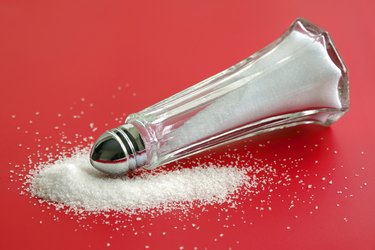
Sodium chloride is the chemical name for common table salt. As a medication, it also comes in forms that include liquid inhalants, injections, eye solutions, eye ointments, nasal solutions, nasal gels and irrigating solutions. You will not typically develop an allergic reaction from consuming table salt., but you can develop an allergic response to sodium chloride medications.
Table Salt Ingestion
Video of the Day
Your body likes to keep its sodium levels within a certain concentration in the fluids inside and outside your cells. If you consume excessive amounts of sodium chloride, you can develop an increase in the fluid outside your cells as a result of your body's natural attempts to restore normal sodium concentrations. If you have a sufficient fluid intake and your kidneys work properly, your body will also attempt to compensate for your sodium chloride consumption by excreting any extra sodium in your urine. However, you can potentially develop excessive sodium symptoms that include diarrhea, abdominal cramping, nausea and vomiting.
Video of the Day
Sodium Chloride Medication Basics
Sodium chloride inhalants are used to dilute other inhaled medications, thin fluid in your lungs, pull water into your breathing tubes or help you expel a mucus or phlegm sample during testing procedures. Nasal sodium chloride can help you thin fluids or restore water in your nasal passages. Topical treatments of the compound can help clean out wounds, while an eye ointment or eye drops can help lower eye swelling. Oral and IV, or intravenous, forms of sodium chloride can be used to increase low sodium levels; IV forms of the medication can also dilute other drugs or help in the treatment of brain swelling or fluid loss.
Allergic Reactions
An allergic reaction to a sodium chloride medication can produce symptoms that include breathing difficulties, hives and swelling in the throat, face, lips or tongue. Seek emergency assistance if you experience any of these symptoms. Additional potential reactions or side effects associated with sodium chloride use include chest pain, chest tightness, swelling in your hands or feet, fatigue, confusion, extreme thirst, increased or decreased urine output, muscle weakness or twitching and impending loss of consciousness. Contact your doctor immediately if you have any of these symptoms. Additional potential reactions that may require emergency attention or a doctor's notification include seizures, fever, bad cough, wheezing and a blue skin coloration.
Considerations
If you're sensitive to sodium, consumption of sodium chloride can raise your blood pressure, which in turn can raise your risks for disease in your kidneys or cardiovascular system. Populations that frequently have sodium sensitivities include African Americans, older people and people with chronic kidney disease, high blood pressure or diabetes. In addition to people with known sodium chloride allergies, individuals who may experience problems while taking a sodium chloride medication include anyone with heart disease, asthma, epilepsy, migraines, congestive heart failure, kidney disease, liver disease or any form of swelling or edema. Consult your doctor for more information on sodium chloride use and sodium chloride allergies.